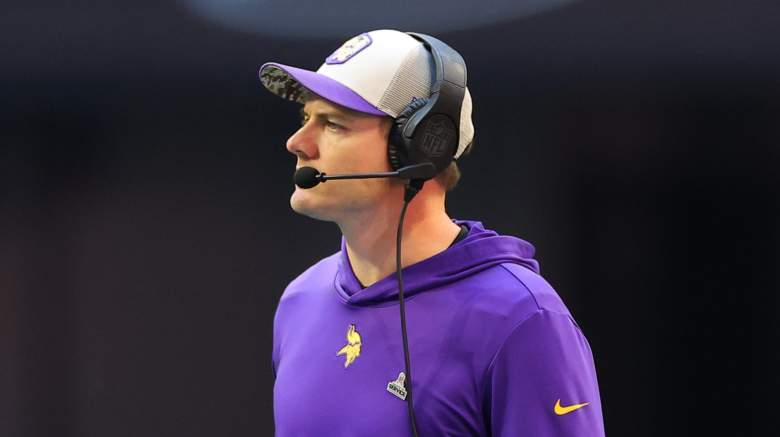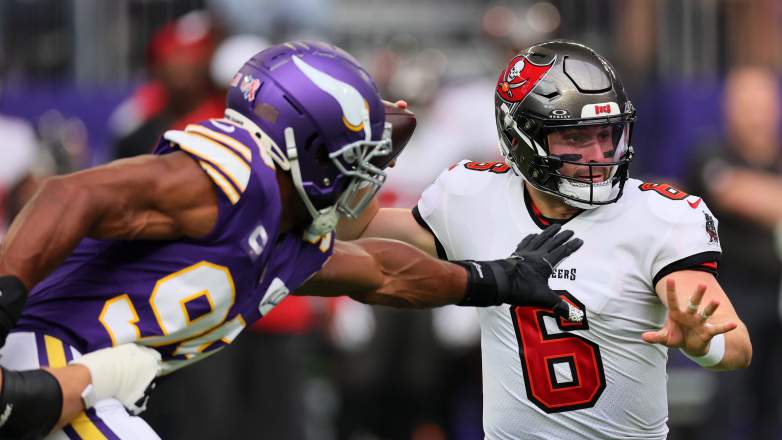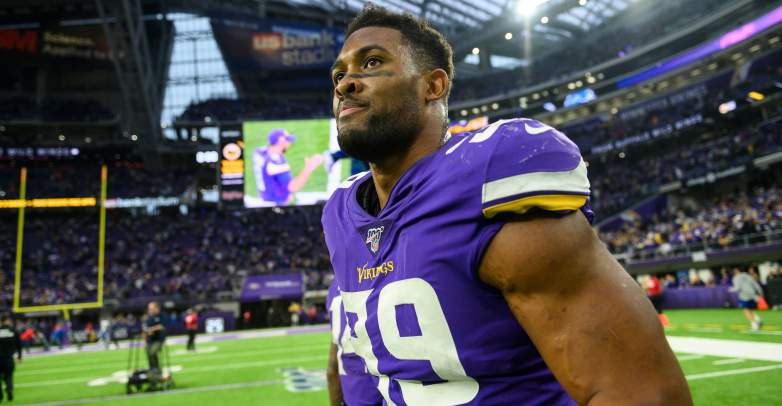
Getty Head coach Kevin O'Connell of the Minnesota Vikings.
The Minnesota Vikings chose not to extend Danielle Hunter on a multiyear deal over the offseason — a decision that is going to cost the franchise one way or another.
Hunter is bound for free agency next March and has a clause in his reworked contract that stipulates the Vikings cannot apply the franchise tag to him. In other words, the only way Minnesota can stop Hunter from leaving is to sign him to a new contract, and he isn’t going to be cheap.
Kristopher Knox of Bleacher Report projected on Monday, November 13, that Hunter will sign a four-year deal for $110 million in 2024 after he hits the open market and starts a bidding war for the NFL’s most successful pass-rusher through 10 weeks of play.
Hunter should interest any team with pass-rushing needs and a fair amount of cap space because he is a scheme-versatile defender. He has experience rushing from the defensive end spot and as a linebacker, although he’s having a career season under first-year Vikings defensive coordinator Brian Flores.
Flores’ system utilizes a three-man front that allows Hunter to come off the edge as a dedicated pressure man. Disguised blitzes have been a big part of Flores’ strategy this season, and no team has blitzed at a higher rate.
Contract-wise, the four-year, $98 million extension that Montez Sweat just signed with the Chicago Bears is probably a starting point for the 29-year-old Hunter.
Advanced Analytics Hurt Danielle Hunter’s Case for Massive Payday in 2024

GettyDanielle Hunter rushes Tampa Bay Buccaneers quarterback Baker Mayfield in September 2023.
Hunter’s 2023 counting statistics are impervious to criticism, as he has proved himself arguably the most effective pass rusher by traditional standards. He currently leads the league in sacks (11) and tackles for loss (14). He has also produced 20 pressures and 12 QB hits through 10 games. Hunter is a three-time Pro Bowler and is essentially guaranteed to earn that honor for a fourth time in 2023.
Those numbers in a contract year will afford Hunter serious negotiating leverage during an age of football in which nearly every QB gets rid of the ball between 2.4 and 3 seconds after the snap, per ESPN Next Gen Stats. The problems for Hunter are that he wins his matchup on pass-rushing downs at a rate slightly below the league average and gets to opposing quarterbacks a little slower than the league average.
Free agent suitors, including perhaps the Vikings themselves, will use these measurements against Hunter at the negotiating table — offering Flores’ system significant credit for Hunter’s success. However, Knox pointed out that a couple of NFC competitors run schemes that offer a good fit for Hunter and those teams may care less about his metrics.
“The Tampa Bay Buccaneers use a similar scheme [as the Vikings], looking to isolate Shaq Barrett and Joe Tryon-Shoyinka. If Tampa could fit Hunter into the rotation, it would be a perfect landing spot for him outside of Minnesota,” Knox wrote. “The Detroit Lions also use a three-man front with Aidan Hutchinson as a dedicated rush linebacker. Hunter would be a great fit there as a complement to Hutchinson and James Houston.”
Vikings Probably Won’t Have Enough Money to Sign Danielle Hunter to Extension

GettyDanielle Hunter.
Over the Cap (OTC) has Hunter’s 2023 valuation pegged at nearly $21.9 million, which is a reasonable starting point for hypothetical negotiations. That number will presumably dip with each passing year, as teams factor age and injury into expected performance.
The top five edge rushers in the NFL earn an average of $27.7 million, which is what a team would pay a player at that position if it franchised him. Knox’s four-year, $110 million contract projection puts Hunter’s deal at almost precisely that number ($27.5 million annually).
General manager Kwesi Adofo-Mensah authorized a raise for Hunter on the final year of his previous deal to $17 million, which can (and likely will) reach $20 million with incentives. But that kind of offer next offseason when Hunter is free to go anywhere he likes simply isn’t going to cut it.
OTC projects the Vikings will have $38.1 million in cap room at their disposal in 2024. The problem is Minnesota must consider what could be a historic deal for wide receiver Justin Jefferson. If he does break the record for the largest deal ever at the position, Jefferson will earn more than $30 million per year over a five-year span with a sizable majority of that number fully guaranteed.
The Vikings will also have to pay a quarterback next season. If that person happens to be Kirk Cousins, the team should expect the cost will be no less than $25 million to $30 million, which is already a significant discount from the $35 million he’s making this year.
In the end, Minnesota cost itself by not signing Hunter long-term over the offseason. Now, the price will either be an onerous contract as the team attempts to rebuild or the loss of its defensive backbone for nothing in return.